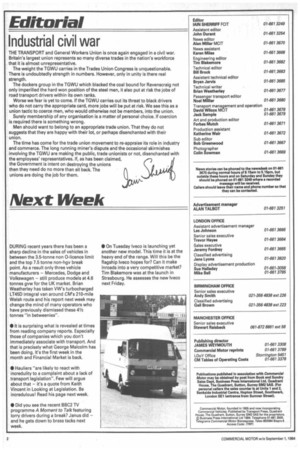Industrial civil war
Page 4

If you've noticed an error in this article please click here to report it so we can fix it.
THE TRANSPORT and General Workers Union is once again engaged in a civil war. Britain's largest union represents so many diverse trades in the nation's workforce that it is almost unrepresentative.
The weight the TGWU carries in the Trades Union Congress is unquestionable. There is undoubtedly strength in numbers. However, only in unity is there real strength.
The dockers group in the TGWU which blacked the coal bound for Ravenscraig not only imperilled the hard won position of the steel men, it also put at risk the jobs of road transport drivers within its own ranks.
Worse we fear is yet to come. If the TGWU carries out its threat to black drivers who do not carry the appropriate card, more jobs will be put at risk. We see this as a union tactic to coerce men, who would otherwise not be members, into the union.
Surely membership of any organisation is a matter of personal choice. If coercion is required there is something wrong.
Men should want to belong to an appropriate trade union. That they do not suggests that they are happy with their lot, or perhaps disenchanted with their union.
The time has come for the trade union movement to re-appraise its role in industry and commerce. The long running miner's dispute and the occasional skirmishes involving the TGWU are making the public, trade unionists or not, disenchanted with the employees' representatives. If, as has been claimed, the Government is intent on destroying the unions then they need do no more than sit back. The unions are doing the job for them.




















































































